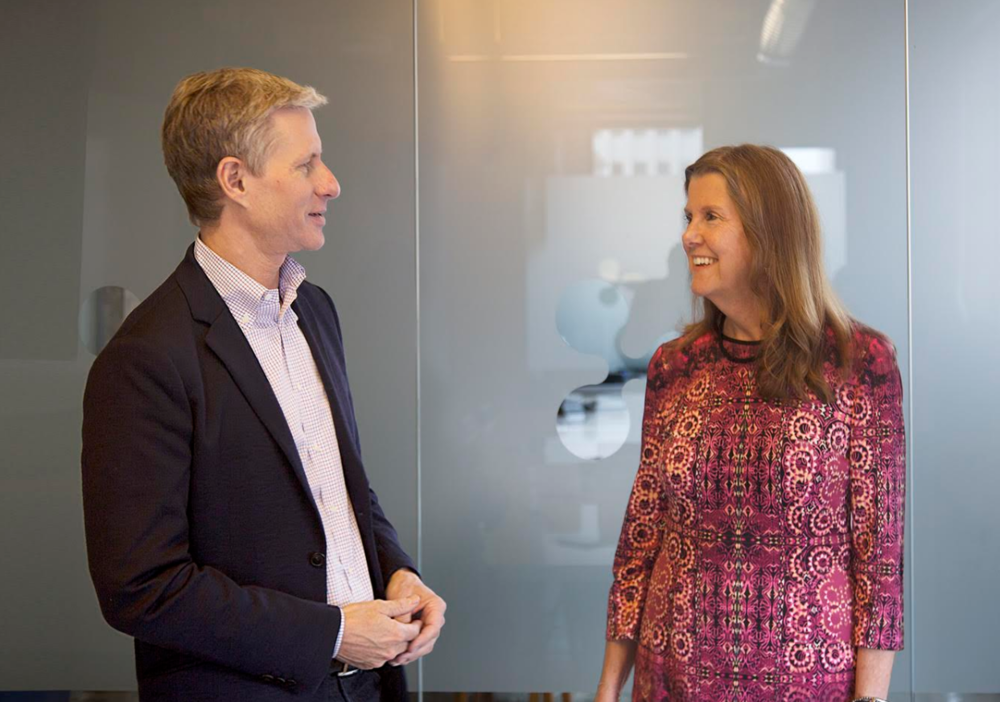
This episode currently has no reviews.
Submit Review- Podcast |
- Barefoot Innovation Podcast
- Publisher |
- Jo Ann Barefoot
- Media Type |
- audio
- Publication Date |
- Nov 10, 2016
- Episode Duration |
- 00:58:07

Welcome to today’s show.
One night last summer I attended a small dinner in New York hosted by the editors of a global financial publication, on financial innovation. We had some of fintech’s brightest stars seated around the table, but I remember offering the view that the person there who was most likely to actually revolutionize the financial system was Chris Larsen, the CEO of Ripple. Most fintech innovators are building new things on the system’s old footings. Ripple is trying to reshape the foundation itself.
As you’ll hear in our discussion, Chris and I first met about five years ago when the wider world had barely heard of Bitcoin, and blockchains and digital currency were still causing mostly head-scratching (at best). He had an impressive past that included co-founding eLoan and Prosper before Open Coin, which is now Ripple. The company’s mission is to create interoperable global finance -- easy movement of money, and other forms of value, throughout the world. An analogy (which we also discussed in my earlier podcast with Circle CEO Jeremy Allaire) is to do for money what the internet did for information, enabling it to move instantly, cheaply, and accurately to everyone, everywhere.
I notice that people whose work is hard to explain use lovely, lively language and imagery. It’s certainly true of Chris. He talks about paper mail and rails and siloes and blocked pipes and, my favorite -- shipping containers, which he says boosted global trade by 700%, with the simple step of standardizing containers so they can fit efficiently on any ship, truck or train, anywhere in the world. He discusses a book on how this changed the world -- The Box by Marc Levinson. That inspired me to include the picture below, of a fully-loaded container ship as it passed along beside my apartment, which overlooks Boston Harbor.

In this episode, Chris says interoperability in finance is the last missing link that’s needed for truly efficient global commerce. He discusses the possible “science fiction” of connecting 50 billion devices through the internet of things. He describes how micropayments can transform functions ranging from ocean monitoring to financial access. He talks about people in huge swaths of Africa who have phones and Google but no connected way to pay for things -- and imagines the global growth that would be sparked by adding two billion people into mainstream payments and commerce. He imagines these solutions even helping to solve the problems caused by globalization.
Chris also talks about the crucial roles of banks, which are key partners for Ripple, and of regulators, including the risk that America’s splintered regulatory system could undermine our leading global role in finance which he says will be “up for grabs” as many countries compete.
And he explains, tellingly, how his views on “disruption” have evolved over time.
We recorded this discussion last summer -- before the presidential election, which he mentions -- and also before Chris’ announcement this month that he plans to step down as Ripple CEO at the end of 2016 in order to rebalance his life. He’ll remain active with Ripple and will work closely with its incoming CEO, Brad Garlinghouse.
More links:
- Chris's blog post on stepping down as CEO is HERE
- Ripple video
- My blog post: The Benefits of Bitcoin
I loved this conversation with Chris Larsen, and I think you will too. Enjoy!
Barefoot Innovation news….
We’re posting this episode during a flurry of activity. Ten days ago I had the fun of doing a fireside chat at Money 2020 with CFPB Director Richard Cordray -- who used the venue to make some big new on big data and data aggregation. I raced back from that to speak last week at the FTC’s fintech conference, and I’ll be missing the 234.html">SEC’s first fintech event next week because I’m off to the Singapore fintech/RegTech festival that’s being co-sponsored by the Monetary Authority of Singapore, MAS. Money 2020 drew 11,000 people this year -- the largest financial conference in the world -- and the Singapore conference expects over 10,000, including for the first-ever RegTech conference in Asia.
Meanwhile, our direct subscribers to Barefoot Innovation more than doubled last month. Every week I’m encountering people who tell me they’re fans of the show. Please do send in your “buck a show” to help us keep it going -- I’m having to bring in more helpers for it. And please remember to review us on Itunes. Also come to the new Facebook fan page. And please come to www.jsbarefoot.com to get onto our mailing list.
Most of all, come back next time, when my very special guest will be global.org/alfred-hannig-afi-executive-director"> Alfred Hannig, the executive director of AFI -- the Alliance for Financial Inclusion. We recorded this one on an idyllic day in beautiful Fiji! AFI is driving tremendous change in global financial inclusion and I know you’ll find the episode fascinating.
Support the Podcast
Subscribe
Sign up with your email address to receive news and updates.
Email AddressWe respect your privacy.
Thank you!This episode currently has no reviews.
Submit ReviewThis episode could use a review! Have anything to say about it? Share your thoughts using the button below.
Submit Review